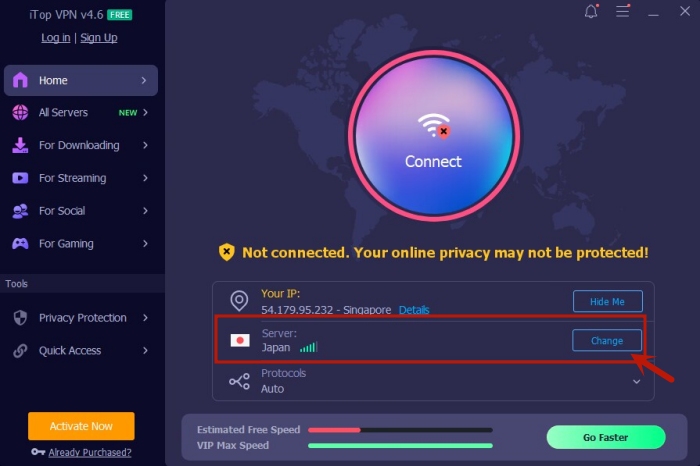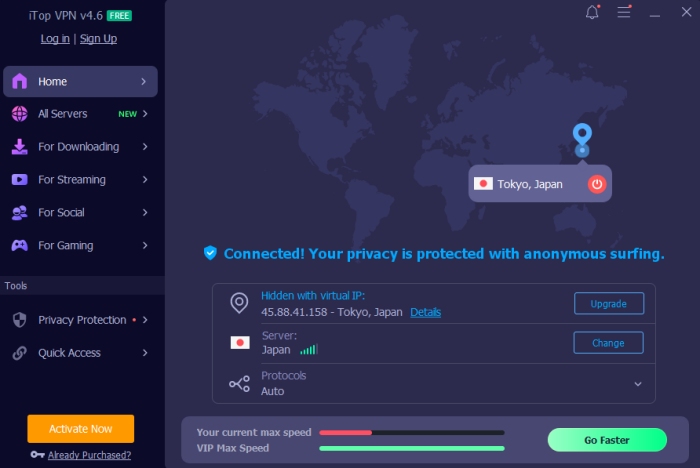What is 256-bit encryption? How does it work? Why do you need it? Explore this article to get the best online security option.
Data security is unquestionably crucial, especially in this digital world. Whether individuals or businesses are seeking more secure encryption technology to protect private information.
With various encryption algorithms in use today, one of the most common encryption standards is the Advanced Encryption Standard (AES). It is a variant of the Rijndael block cipher and comes in three key sizes: 128, 192, and 256 bits, of which 256 is deemed the most secure.
We will mainly explain to you what the 256 bit encryption is, how it works, and why you should opt for it.

Typically, encryption uses mathematical algorithms to protect information by splitting data into chunks, replacing different bytes, and shifting rows and columns to scramble the message completely. The entire process ends with a completely random character set that cannot be interpreted by anyone without a decryption key. Let's dig into this cryptic encryption technology. The following are the three main types of decryption keys.
Data Encryption Standard (DES Encryption)
Data Encryption Standard (DES) is a symmetric key algorithm for digital data encryption that uses the same key to encrypt and decrypt messages. So far, DES has lost its place in the field of digital securities due to its short key length of 56 bits.
Advanced Encryption Standard (AES Encryption)
The AES encryption algorithm is a symmetric block cipher used globally in software and hardware to encrypt confidential data. It is considered the best bet for secure data transfer protection and is widely used by the U.S. government, corporations, and security organizations.
Rivest-Shamir-Adleman (RSA) Encryption
RSA is an asymmetrical encryption type that employs two different but interrelated keys. In addition, it is a public key cryptosystem that is extensively practiced for secure data transmission.
As mentioned above, AES encryption uses symmetric key encryption to encrypt multi-bit data blocks, and AES 256-bit encryption is the most trusted one.
Advanced Encryption Standard (AES) 256-bit encryption refers to the length of the encryption key used to encrypt or decrypt the data transmitted between the server and the client. This means that if a hacker or cracker didn't have the decryption key, they would need 2^256 different combinations to break a 256-bit encrypted message, and it would be nearly impossible for the fastest computer to do so.
The larger the algorithm key size is, the more difficult it is to crack. 256 bit encryption is considered to be the strongest level of encryption as is the longest encryption key by far. It is therefore not surprising that 256-bit encryption has emerged as the encryption standard for securing data communications in the U.S. government and private sector.
In a world of increasingly transparent information, encryption is put at the forefront of web surfing security and personal data protection. AES-256, the most secure encryption key, provides the highest level of anonymity from brute force attacks. Besides, it brings fast speed, which means you won't experience significant performance delays when you surf the Internet using a VPN with AES-256 encryption on the server. For safety, convenience and security, use an AES-256 encrypted VPN.
iTop VPN, stands out as a free VPN powered with 256 bit encryption, is on our top recommended list. This 256-bit encrypted VPN masks your real IP address and encrypts your private data for ultimate data protection security. Whether you're a journalist, traveler, or just a regular person with premium privacy demands, you need a 256-bit encrypted VPN.
So what you can receive from this 256 bit encryption VPN?
Get 256 bit encryption free. You can obtain this advanced military-grade encryption technology to secure your personal data absolutely free of charge. In addition, being protected by iTop VPN, enjoy smooth streaming VPN service free without fear.
Private & anonymous browsing. This untraceable VPN promotes online security, shields your anonymity, and creates a safe cyberspace for you. For example, when shopping online, iTop VPN can protect your payment information from falling into the wrong hands with AES 256-bit encryption.
Bypass government surveillance. iTop VPN, this 100% Free VPN allows you to alter your real IP address to another country, bypassing government surveillance or any unauthorized snooping attempts, and safeguarding data from global cyber-attacks.
How to use this most secure VPN? Easy, follow the steps below to obtain this free 256 bit encryption VPN.
Step 1. Hit Download below and follow the on-screen instructions to install.
Step 2. Choose a desired IP address or simply click Smart Location to auto select a stable and fast server.

Step 3. Click Connect, now your cyber security is safely protected by 256 bit encryption, enjoy your private browsing now!
1. Is AES encryption symmetric or asymmetric?
Symmetric/asymmetric is frequently applied in cryptography and computer security fields. Symmetric encryption uses the same key while asymmetric uses different keys for each process. AES is a symmetric algorithm for encryption and decryption based on the same 128, 192, or 256 bit key.
2. Is 256-bit encryption safe?
Yes, 256-bit encryption is considered an extremely secure encryption method due to its numerous possible combinations and is vastly applied in the government and military industries.
3. Which VPN uses AES 256?
NordVPN, ExpressVPN, Surfshark and iTop VPN all use AES 256 bit encryption; iTop VPN, in particular, offers a free plan for free VPN streaming and gaming with security guarantees.
Encryption is a complex technical matter for network security. Go get a VPN powered with AES 256 bit encryption for your cybersecurity and anonymity. iTop VPN comes as your first pick for strong security and privacy protection. Get paid VPN services with strong encryption, DNS protection, security protocols, and more for free. No need to wait, try it now!